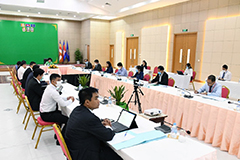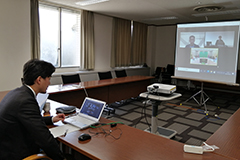Policy Recommendations on Interest Rate Ceiling for Cambodian Microfinance Institutions
2021.04.05
Research Fellow Aiba Daiju and Visiting Fellow Sovannroeun Samreth (Associate Professor, Saitama University) of the JICA Ogata Sadako Research Institute for Peace and Development (JICA Ogata Research Institute) participated online in a meeting of the Interest Rate Ceiling Committee held in Cambodia on Feb. 10, 2021.
The Interest Rate Ceiling Committee is an inter-ministerial committee among ministries and agencies such as the Ministry of Economy and Finance, and chaired by Neav Chanthana, deputy governor of the National Bank of Cambodia (NBC), which is the central bank of Cambodia. The Committee is an opportunity for policy consultation regarding the upper limit on lending rates in the financial sector of Cambodia. The main responsibility of the committee is to monitor and study on applicable measures that have been issued to explore more possibility for reducing interest rate, operational expenses, fees, commissions. The recent Committee meeting was attended by representatives from NBC, related ministries such as the Ministry of Economy and Finance and the Ministry of Education, Youth, and Sport, and the Cambodian Microfinance Association.

Online meeting of the Interest Rate Ceiling Committee was held in Cambodia
Following the opening remarks by Neav, Aiba and Samreth each gave presentations. In the JICA Ogata Research Institute research project entitled “Study on the Promotion of Financial Inclusion: The Case of Cambodia,” both researchers studied the impact on financial inclusion caused by the annual interest ceiling of 18% that was enacted for microfinance institutions in April 2017. Based on the results of their studies, the two researchers made policy recommendations regarding the current interest rate ceiling.
First, Samreth discussed the results of the analysis on the impact of the interest rate cap on households, which is based on an interview survey conducted for 1,000 Cambodian households by the JICA Ogata Research Institute in 2019. By analyzing the survey results, he reported that the average level of the current interest rate is lower than the average level of the interest rate on lending prior to the regulation. And he indicated that the average loan processing fee charged by microfinance institutions increased. But, overall, the average effective interest rate (i.e., the average credit cost) decreased after the regulation. Furthermore, he found that higher financial literacy rate can reduce the debt service burden among borrowers. Next, Aiba discussed the results of the analysis using loan account data of all financial institutions in Cambodia. There were a total of 7 million account-level observations of loan disbursement from 2016 to 2019 held by Credit Bureau Cambodia. Aiba explained that there has been a decrease in lending to the poor after the regulations were enacted, and that the amount lent to the poor in each case is increasing.
Based on these survey results, Aiba made the following policy recommendations for the current interest rate ceiling: “The current interest rate regulations make it particularly difficult to lend small amounts, and lending to the poor is decreasing. Therefore, it is necessary to enact regulations in order to flexibly control interest rates based on the results of regulations, or to take measures to reduce the impact on lending to the poor. Accordingly, it is necessary to further increase the transparency of operations by microfinance institutions. As processing fees are imposed by an increasing number of financial institutions and the proportion of informal finance borrowing increases, it is important to improve the financial literacy of borrowers in order to prevent the problem of excessive debt.”

Research Fellow Aiba Daiju made policy recommendations for the current interest rate ceiling
In response, Cambodian officials said that over the past few years, NBC has collaborated with the Ministry of Education to improve the financial literacy of students by introducing financial education into the school curriculum, and that NBC has cooperated with the Ministry of Women’s Affairs to improve the financial literacy of women. They said that in such ways, NBC is continuously taking measures to improve financial literacy, and will continue activities aimed at future improvement.
The results of the analysis announced at the meeting have been published as a discussion paper at the Strategic Research Area for Sustainable Development in East Asia, Saitama University. Additionally, the policy recommendations will be announced as policy notes of the JICA Ogata Research Institute in the future.
JICA Ogata Research Institute will continue research aimed at solving issues facing the Cambodian microfinance sector, such as the impact of an interest rate ceiling, financial literacy, and excessive debt. Furthermore, we will update research results on the impact of interest rate regulations as necessary through working papers and other publications.

事業事前評価表(地球規模課題対応国際科学技術協力(SATREPS)).国際協力機構 地球環境部 . 防災第一チーム. 1.案件名.国 名: フィリピン共和国.

事業事前評価表(地球規模課題対応国際科学技術協力(SATREPS)).国際協力機構 地球環境部 . 防災第一チーム. 1.案件名.国 名: フィリピン共和国.

事業事前評価表(地球規模課題対応国際科学技術協力(SATREPS)).国際協力機構 地球環境部 . 防災第一チーム. 1.案件名.国 名: フィリピン共和国.

事業事前評価表(地球規模課題対応国際科学技術協力(SATREPS)).国際協力機構 地球環境部 . 防災第一チーム. 1.案件名.国 名: フィリピン共和国.

事業事前評価表(地球規模課題対応国際科学技術協力(SATREPS)).国際協力機構 地球環境部 . 防災第一チーム. 1.案件名.国 名: フィリピン共和国.
scroll